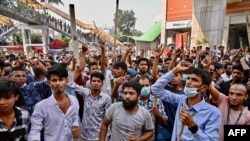The United States has called on Bangladesh’s garment industry to revisit its minimum wage decision and condemned recent violence against protesting workers and the “criminalization of legitimate worker and trade union activities.”
During protests on Wednesday, a 23-year-old woman Wednesday was killed during clashes with police. The widower of Anjuara Khartun, a sewing machine operator and mother of two, tells AFP that his wife was shot in the head by police when they opened fire on protesters in the garment making hub of Gazipur, outside the capital of Dhaka.
Her death is the third since protests began.
On Tuesday, a government-appointed panel of factory owners, union leaders and officials announced they were raising the minimum wage for garment workers by 56% to about $118 per month. However, protesters have continued their demonstrations and are demanding wages be raised to $208 a month.
In a statement on Wednesday, the U.S. State Department praised those who have endorsed the wage increase proposed by union workers.
“The United States urges the tripartite process to revisit the minimum wage decision to ensure that it addresses the growing economic pressures faced by workers and their families,” State Department Spokesperson Matthew Miller said in a statement.
Miller referred to an internationally-backed system set up for negotiations between parties in regard to labor laws. The system was set up following the 2013 Rana Plaza garment factory building collapse in Dhaka, which left at least 1,134 people dead.
The United States also called on Bangladesh to allow for peaceful protests, citing concern over “repression of workers and trade unionists."
Bangladesh relies on the garment industry for 16% of its GDP. The industry employs 4 million workers across 3,500 factories, making Bangladesh the second-largest garment-producing nation behind China.
The country is a main supplier for many top clothing brands, such as H&M and GAP.
Some information in this report came from Agence France Presse and Reuters





